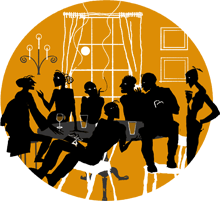Unbearable Lightness of Citizenship
Mon, Feb 14 2022 01:23
| Permalink
Return of Birmingham Salon Saturdays
We are very pleased to return to our in-person Saturday discussions. To relaunch these events, we will run the one which was cancelled in March 2020 as the pandemic restrictions started.
Birmingham Salon has changed venue to The Arthur Sullivan Room at Birmingham Midland Institute on Margaret Street. It's a convenient central Birmingham venue only a few minutes walk from our previous home at The Old Joint Stock pub. And of course, the BMI has a long and impressive history. It was founded in 1854 by an Act of Parliament for the "diffusion and advancement of Science, Literature, and Art among all Classes of Persons resident in Birmingham and the Midland counties."
The Unbearable Lightness of Citizenship
Saturday 2nd April, 1.00 pm - 5.00 pm
Birmingham Midland Institute, 9 Margaret Street, Birmingham B3 3BU
Tickets £15 (includes tea/coffee) from EventBrite
Citizenship, identity, and belonging
1.15 pm - 2.45 pm
In Ancient Athens and Rome, citizenship developed as a bond between an individual and the city-state. Since the American and French Revolutions, the idea of increasing numbers of people being citizens went in tandem with the development of nation states, and a reciprocal relation of state protection of individual rights for allegiance to the nation. In the 19th and 20th centuries, the nation state became linked to imperialism, nationalism and tyranny even as masses of citizens got the right to vote and got rid of colonial rulers.
This discussion will look at the idea of citizenship in the 21st century and whether citizenship been replaced by individuated, consumerist and cultural identities. Are we too divided by identities of race, gender and political affiliations to identify as citizens of a nation? What is the relationship between citizenship and language, culture, place and participation in common goals and ideals? If citizenship is more than visas, passports, pledges of allegiance, and other trappings of state organised process, what is it?
Speakers
Dr Alka Sehgal Cuthbert, Head of Education and Co-ordinator, Don't Divide Us. Author What Should Schools Teach?Disciplines, Subjects and the Pursuit of Truth.
Mladen Pupavac, co-author Changing European Visions of Disaster and Development. Mladen has taught International Relations at Harlaxton College, University of Derby, and University of Leicester. He previously worked as a translator for the UN International Criminal Court in The Hague.
Chair
Chrissie Daz
Reading for this session
Would you want London to be overrun with Americans like me? Lionel Shriver, The Spectator
In defence of immigrants, a reply to Lionel Shriver, Alka Seghal Cuthbert, Areo Magazine
How identity stole the debate, Olivier Roy, Green European Journal
Laicete and the need for a narrative in common, Don't Divide Us
tea and coffee break - 2.45 - 3.15 pm
The emergency state citizen
3.15 pm - 4.45 pm
Our second discussion will review the situation of citizens following the last two years of pandemic measures both in relation to government and to each other.
Since March 2020, large numbers of people, under quite extreme conditions, conformed with requirements: millions of us following restrictions that were often bizarre and led in some cases to immense personal distress. On the other hand, a significant number have rejected vaccination which has led for some to a major impingement on their participation in society, job loss or loss of sick pay, scapegoating for the problems of others, and to cases of severe ill health or death which could possibly have been avoided.
Whether it's the behaviourists of SAGE, governments using nudge theory, the fact checking and censorship carried out by big tech and social media companies, or the popularisation of the concept of mass formation psychosis, the view that people are easily manipulated and misled appears predominant across the political spectrum.
The political ideal of citizenship in a democracy requires us to be free, morally autonomous beings using reason and judgment, who can take an active part in the direction and running of the nation. How far are we from this ideal, and what do we need to realise it?
Speakers
Dr Ayoub Bouguettaya, School of Psychology, University of Birmingham. His current research interests include Covid 19 and messaging norms, behavioural economics from a social identity perspective (nudges), and conspiracy theories and social identity.
Dr Greg Scorzo, PhD in Meta-Ethics, author Love Before Covid, host Art of Thinking Podcast and editor of Culture on the Offsenive magazine.
Vanessa Pupavac, senior lecturer, School of Politics and International Relations, University of Nottingham. Co-author Changing European Visions of Disaster and Development (2020). Vanessa has recently published a pamphlet, "Translation as Liberation" with the Letters on Liberty series.
Chair
Rosie Cuckston
Reading for this session
How the psychology of blame can explain Covid 19 responses, Ayoub Bouguettaya & Victoria Team, The Conversation
How Covid Stole our Privacy, we have outsourced our morality to machines, Timandra Harkness, UnHerd
The Virus, Lockdown and the Right, Niall McCrae & M.L.R. Smith, Areo Magazine
Fear and Panic in Progressive England The Guardian's Pandemic, Jobbing Leftie Historian blog
The Failure to Think, Bafflement Essay 3, Alex Klaushofer, Ways of Seeing Substack
Our next event will be on Saturday 7th May on the theme of law and justice.
Comments
